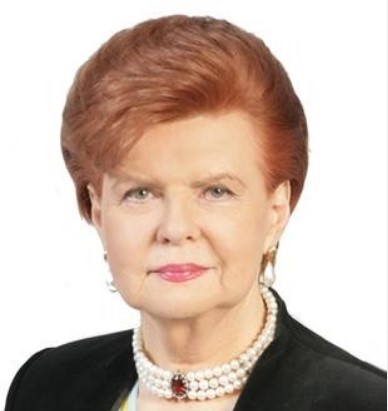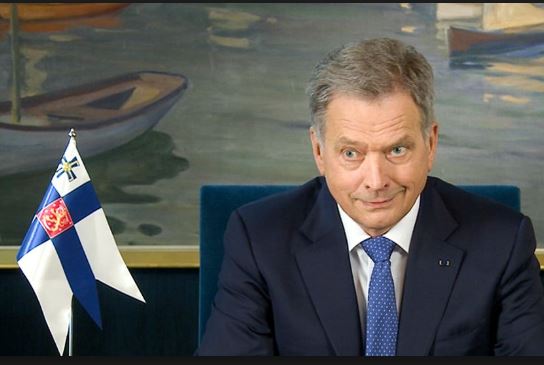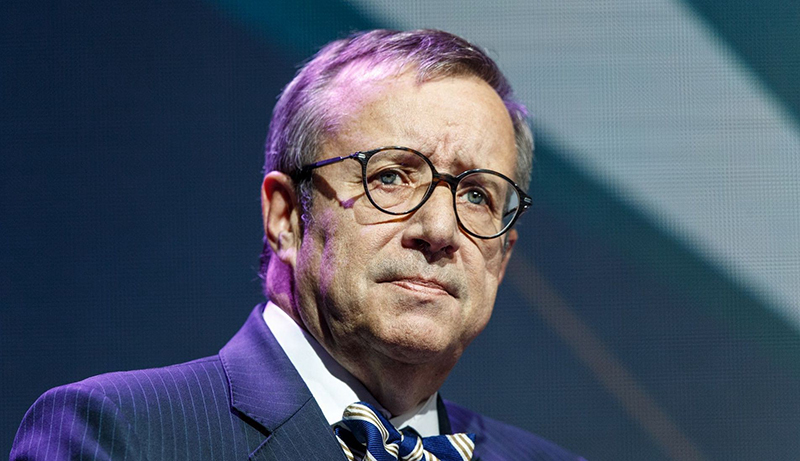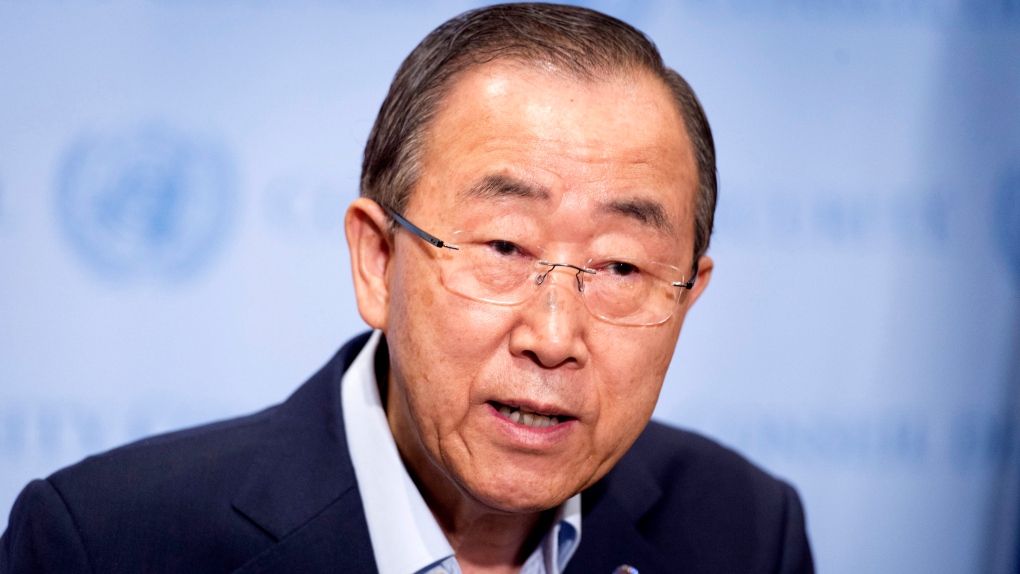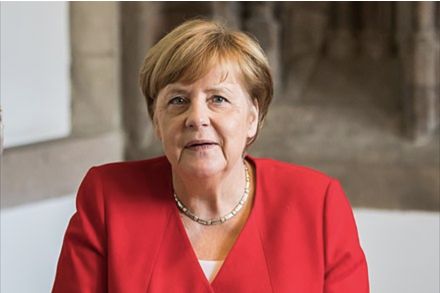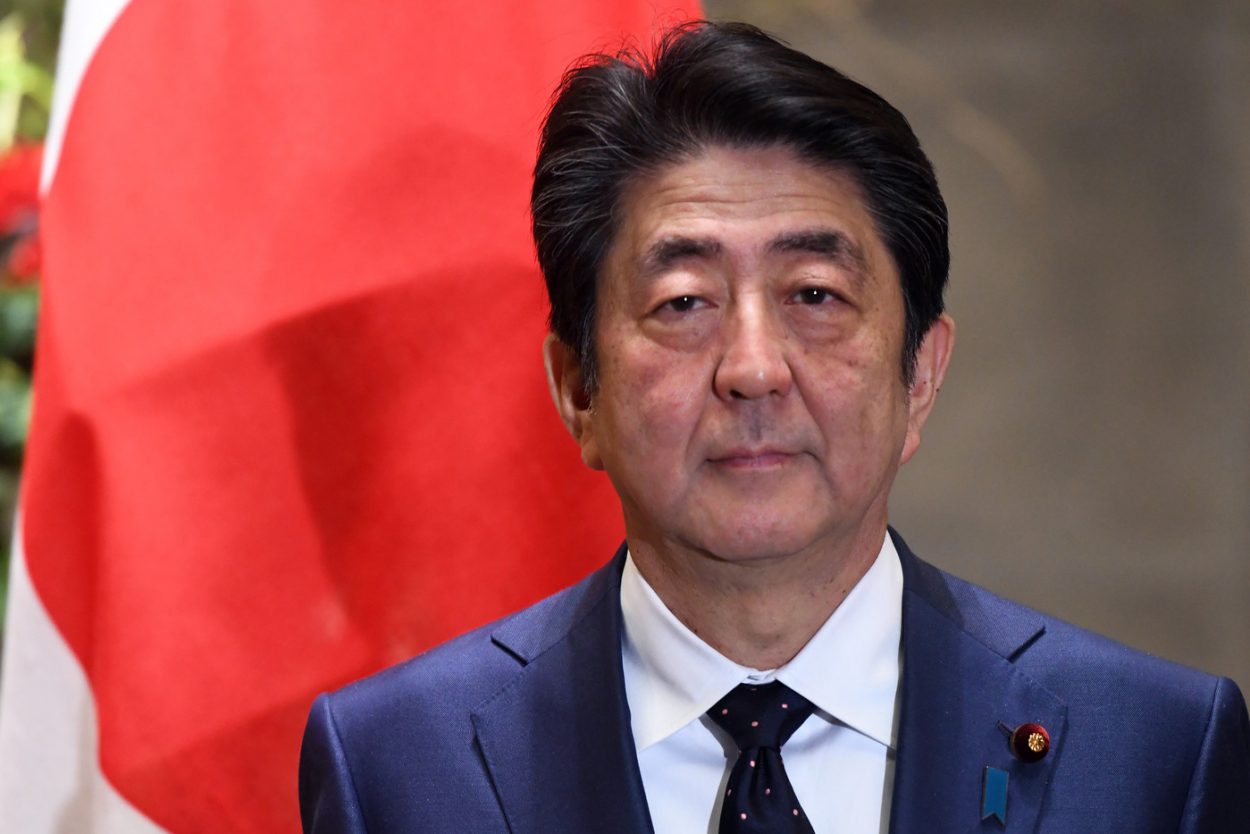World Leaders For Peace and Security
World Leader for Peace and Security Award 2019
Dr. Vaira Vike-Freiberga has been the President of the World Leadership Aliance Club of Madrid since 2014 and is former President of Latvia (1999-2007). She was instrumental in achieving membership in the European Union and NATO for her country, and was Special Envoy on UN reform among her international activities. Since 2007, she is an oft invited speaker on social issues, moral values, and democracy. She was Vice-chair of the Reflection group on the long term future of Europe, and chaired the High-level group on freedom and pluralism of media in the EU.

Having left Latvia as a child refugee to Germany in 1945, then French Morocco and Canada, she earned a Ph.D. in psychology (1965) at McGill University. After a distinguished career as Professor at the University of Montreal, she returned to her native country in 1998 to head the Latvian Institute.A year later she was elected President by the Latvian Parliament and re-elected in 2003.
She is member of four Academies, and Board member or patron of 30 international organizations, including the Board of Thinkers of the Boston Global Forum. She has received many highest Orders of Merit, as well as medals and awards, for distinguished work in the humanities and social sciences. She has published 14 books and authored over 200 articles, book chapters, reports, and audiovisual materials.
World Leader for Peace and Security Award 2018
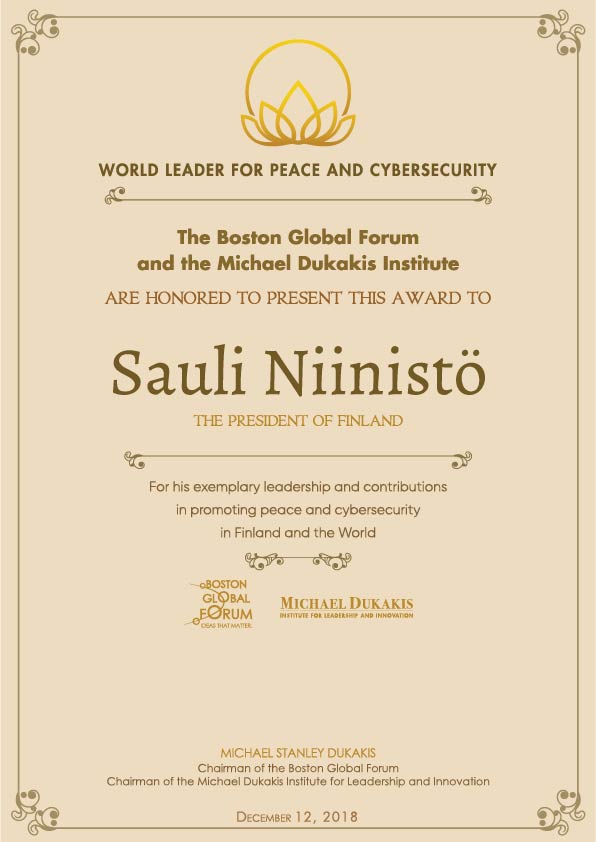
The World Leader for Peace and Cybersecurity Award for 2018
President Sauli Niinistö – President of the Republic of Finland received the World Leader for Peace and Cybersecurity Award from the Boston Global Forum (BGF) and the Michael Dukakis Institute for Leadership and Innovation (MDI). He was honored during Global Cybersecurity Day, which is observed on December 12 each year.
The goal of Global Cybersecurity Day is to inspire the shared responsibility of the world’s citizens to protect the Internet’s safety and transparency. This year’s conference revolved around the theme “AI solutions solve disinformation“. During the discussion, experts explored the current state of cybersecurity and the threat posed by disinformation, anonymous sources and fake news as well as the role AI can play as an effective defense mechanism against these threats to truth and the principles of democracy.
Former Massachusetts Governor Michael Dukakis, Chairman and Co-founder of BGF & MDI, moderated this year’s event.
President Niinistö was presented with the World Leader for Peace and Cybersecurity Award for his leadership role in establishing Finland as a vital member of the world community and his support of The European Centre of Excellence for Countering Hybrid Threats. In this role, he has fostered the understanding of, and solutions to the numerous threats we face from political forces, economic instability, military intervention, civil unrest, climate change, and unsafe Internet practices.
In a video message presented at the Global Cybersecurity Day Symposium, President Niinistö expressed his honor to receive this award and emphasized the importance of cooperation between nations to tackle the issues related to ongoing cyberthreats. “To increase national cybersecurity, all nations need to do their upmost to increase awareness among their citizens in all sectors of society. In cyberspace, we need to strengthen our cooperation between nations and rules over international borders,” said President Niinistö.
He said that he hopes the establishment of an intergovernmental think tank— The European Centre of Excellence for Countering Hybrid Threats—will make our society more secure. In conclusion he also highlighted the role of women in the era of rapid technological development. “Unlocking their full potential is crucial for our success as an international community. We should educate and advocate more young women to become active in this field. It will make us better prepared to profit from the immense opportunity that the digital era affords us.”
To guarantee the interoperability among different frameworks and approaches of governments, given the conditions of uncertainty and complexity in the AI ecosystem, Boston Global Forum – Michael Dukakis Institute for Leadership and Innovation (BGF-MDI) published AIWS Report on AI Ethics and proposed the model for Government AIWS Ethics and Practices Index. Also, BGF-MDI cooperated with AI World to form a strategic alliance host of the AI World Government Conference & Expo, on June 24 to 26, 2019, Washington, D.C.
Watch the full speech here:
World Leader for Peace and Security Award 2017
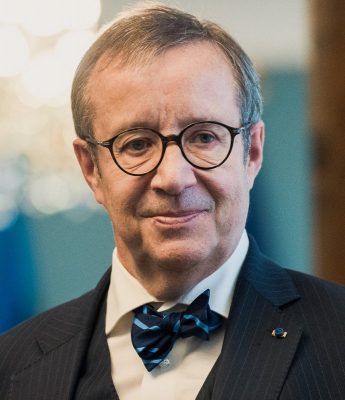
Toomas Hendrik Ilves, Former President of the Republic of Estonia
Toomas Hendrik Ilves served as the fourth President of Estonia from 2006 to 2016, previously served in the government as Minister of Foreign Affairs from 1996 to 1998 and again from 1999 to 2002. He was key in driving the initiatives in e-government and cyber security for which the country has been acknowledged as a world-leader.
From 1993 to 1996, Ilves served in Washington as the Ambassador of the Republic of Estonia to the United States of America and Canada. During this time he initiated with education minister Jaak Aaviksoo the Tiger Leap initiative to computerize and connect all Estonian schools online.
In 2004, Ilves was elected a Member of the European Parliament, where he was vice-president of the Foreign Affairs Committee. As an MEP, he initiated the Baltic Sea Strategy that later was implemented as official regional policy of the European Union.
Toomas Ilves was elected President of the Republic of Estonia in 2006, and was re-elected for a second term in office in 2011. In June 2017, President Ilves was awarded the Reinhard Mohn Prize entitled, “Smart Country: Connected. Intelligent. Digital.”
During his presidency, Ilves was appointed to serve in several high positions in the field of ICT in the European Union. He served as Chairman of the EU Task Force on eHealth from 2011 to 2012. From 2012 to 2014, at the invitation of the European Commission, he was Chairman of the European Cloud Partnership Steering Board. From 2014 to 2015, he was the co-chair of the advisory panel of the World Bank’s World Development Report 2016 “Digital Dividends” and since June 2014, the chair of World Economic Forum’s Global Agenda Council on Cyber Security.
Since November 2016, Ilves has co-chaired the Global Futures Council on Blockchain Technology, a working group set up by the World Economic Forum focusing on how blockchain technology can be used to improve the security of the internet.
His interest in computers started at an early age – he learned to program at the age of 13, and he has been promoting Estonia’s IT-development since the country restored its independence. During recent years, Ilves has spoken and written extensively on integration, trans-atlantic relations, e-government, cyber security and other related topics. He has published many essays and articles in Estonian and English on numerous topics ranging from Estonian language, history and literature to global foreign and security policy and cyber security.
Having realized just how important the early adoption and acquisition of digital skills were before many others did, President Ilves was named the World Leader in Cybersecurity with his contributions by the Boston Global Forum and the Michael Dukakis Institute on December 12, 2017 at Loeb House, Harvard University.
World Leader for Peace and Security Award 2016
At its second annual Global Cybersecurity Day conference, the Boston Global Forum will announce the recipient of this year’s “World Leader for Peace, Security, and Development” award:
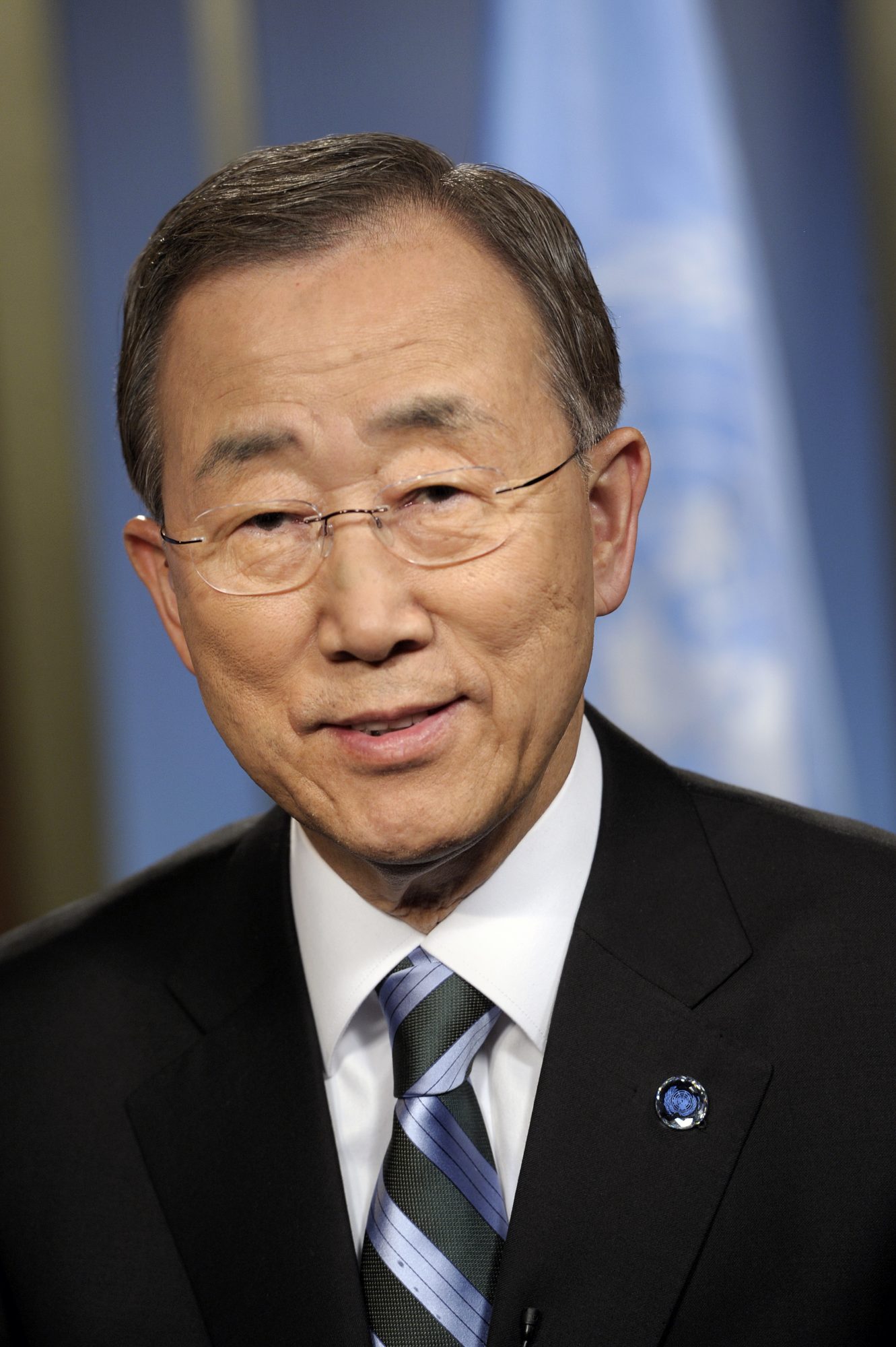
Ban Ki Moon, United Nations Secretary General.
The Boston Global Forum is recognizing Ban for leading the UNESCO Global Education First Initiative whose aim is to put every child in school because education is a right, improve the quality of learning to include improving world literacy and foster global citizenship that cultivates respect for the world, each other and prepares children for the interconnected challenges of the 21st Century.
Ban Ki-moon was the eighth Secretary-General of the United Nations. His priorities have been to mobilize world leaders around a set of new global challenges, from climate change and economic upheaval to pandemics and increasing pressures involving food, energy and water. He has sought to be a bridge-builder, to give voice to the world’s poorest and most vulnerable people, and to strengthen the Organization itself.
“I grew up in war”, the Secretary-General has said, “and saw the United Nations help my country to recover and rebuild. That experience was a big part of what led me to pursue a career in public service. As Secretary-General, I am determined to see this Organization deliver tangible, meaningful results that advance peace, development and human rights.”
Mr. Ban held office from on 1 January 2007 to 31 December 2016. On 21 June 2011, he was unanimously re-elected by the General Assembly for a second mandate.
One of the Secretary-General’s first major initiatives was the 2007 Climate Change Summit, followed by extensive diplomatic efforts that have helped put the issue at the forefront of the global agenda. Subsequent efforts to focus on the world’s main anti-poverty targets, the Millennium Development Goals, have generated more than $60 billion in pledges, with a special emphasis on Africa and the new Global Strategy on Women’s and Children’s Health. At the height of the food, energy and economic crises in 2008, the Secretary-General successfully appealed to the G20 for a $1 trillion financing package for developing countries and took other steps to guide the international response and protect the vulnerable and poor.
The Secretary-General pressed successfully for the creation of UN Women, a major new agency that consolidates the UN’s work in this area. His advocacy for women’s rights and gender equality has also included the “Unite to End Violence against Women” campaign, the “Stop Rape Now” initiative, the creation of a “Network of Men Leaders” and the establishment of a new Special Representative on Sexual Violence in Conflict. Within the UN itself, the Secretary-General has increased the number of women in senior management positions by more than 40 per cent, reaching the highest level in the Organization’s history.
Ban Ki-moon has sought to strengthen UN peace efforts, including through the New Horizons peacekeeping initiative, the Global Field Support Strategy and the Civilian Capacity Review, a package of steps to improve the impact of the 120,000 United Nations “blue helmets” operating in the world’s conflict zones. A mediation support unit, along with new capacity to carry out the Secretary-General’s good offices, have been set up to help prevent, manage and resolve tensions, conflicts and crises. Accountability for violations of human rights has received high-level attention through inquiries related to Gaza, Guinea, Pakistan and Sri Lanka, legal processes in Lebanon and Cambodia, and advocacy for the “responsibility to protect,” the new United Nations norm aimed at prevent and halt genocide and other grave crimes. He has also sought to strengthen humanitarian response in the aftermath of mega-disasters in Myanmar (2008), Haiti (2010) and Pakistan (2010), and mobilized UN support for the democratic transitions in North Africa and the Middle East.
Mr. Ban has sought to rejuvenate the disarmament agenda through a five-point plan, efforts to break the deadlock at the Conference on Disarmament and renewed attention to nuclear safety and security in the aftermath of the tragedy at the Fukushima Daiichi Nuclear Power Plant.
The Secretary-General has introduced new measures aimed at making the United Nations more transparent, effective and efficient. These include heightened financial disclosure requirements, compacts with senior managers, harmonization of business practices and conditions of service, the adoption of International Public Sector Accounting Standards, and continued investments in information technology and staff development.
The Secretary-General was born in the Republic of Korea on 13 June 1944. He received a bachelor’s degree in international relations from Seoul National University in 1970. In 1985, he earned a master’s degree in public administration from the Kennedy School of Government at Harvard University.
At the time of his election as Secretary-General, Mr. Ban was his country’s Minister of Foreign Affairs and Trade. His 37 years of service with the Ministry included postings in New Delhi, Washington D.C. and Vienna, and responsibility for a variety of portfolios, including Foreign Policy Adviser to the President, Chief National Security Adviser to the President, Deputy Minister for Policy Planning and Director-General of American Affairs.
Mr. Ban’s ties to the United Nations date back to 1975, when he worked for the Foreign Ministry’s United Nations Division. That work expanded over the years, with assignments that included service as Chairman of the Preparatory Commission for the Comprehensive Nuclear Test Ban Treaty Organization and Chef de Cabinet during the Republic of Korea’s 2001-2002 presidency of the UN General Assembly. Mr. Ban has also been actively involved in issues relating to inter-Korean relations.
Ban Ki-moon and his wife, Madam Yoo (Ban) Soon-taek, whom he met in high school in 1962, have one son, two daughters and three grandchildren.
Since 2007, Mrs. Ban has devoted her attention to women’s and children’s health, including autism, the elimination of violence against women, and the campaign to prevent mother-to-child transmission of HIV/AIDS.
World Leader for Peace and Security Award 2015
Who Is Angela Merkel?
Angela Dorothea Kasner, better known as Angela Merkel, was born in Hamburg, West Germany, on July 17, 1954. Trained as a physicist, Merkel entered politics after the 1989 fall of the Berlin Wall. Rising to the position of chairwoman of the Christian Democratic Union party, Merkel became Germany’s first female chancellor and one of the leading figures of the European Union, following the 2005 national elections.
Early Years
German stateswoman and chancellor Angela Merkel was born Angela Dorothea Kasner on July 17, 1954, in Hamburg, Germany. The daughter of a Lutheran pastor and teacher who moved his family east to pursue his theology studies, Merkel grew up in a rural area north of Berlin in the then German Democratic Republic. She studied physics at the University of Leipzig, earning a doctorate in 1978, and later worked as a chemist at the Central Institute for Physical Chemistry, Academy of Sciences from 1978 to 1990.
First Female Chancellor
After the fall of the Berlin Wall in 1989, Merkel joined the Christian Democratic Union (CDU) political party. Soon after, she was appointed to Helmut Kohl’s cabinet as minister for women and youth, and later she served as minister for the environment and nuclear safety. Following Kohl’s defeat in the 1998 general election, she was named secretary-general of the CDU. In 2000, Merkel was chosen party leader, but she lost the CDU candidacy for chancellor to Edmund Stoiber in 2002.
In the 2005 election, Merkel narrowly defeated Chancellor Gerhard Schröder, winning by just three seats, and after the CDU agreed a coalition deal with the Social Democrats (SPD), she was declared Germany’s first female chancellor. Merkel also became the first former citizen of the German Democratic Republic to lead the reunited Germany and the first woman to lead Germany since it became a modern nation-state in 1871. She was elected to a second term in 2009.
Merkel made headlines in October 2013 when she accused the U.S. National Security Agency of tapping her cell phone. At a summit of European leaders she chided the United States for this privacy breech, saying that “Spying among friends is never acceptable.” Shortly afterward, in December 2013, she was sworn in for a third term.
World Leader for Peace and Security Award 2015
Prime Minister Shinzo Abe extended his appreciation for being chosen as the recipient of Boston Global Forum’s World Leader in Cybersecurity Award, and expressed his commitment to take all efforts to reinforce the cybersecurity both in Japan and abroad.
The messages was sent to Boston Global Forum’s Global Cybersecurity Day First event which was held in the America-Japan Society, Tokyo at 12:00 noon local time on December 12, 2015 ( at 10:00 PM December 11 in Boston time).
In the PM Abe’s view, cybersecurity is a critical issue to the national security and Japan’s crisis management, as well as an important element fostering the Japan’s Growth Strategy. He said his government will “take all possible means to ensure cybersecurity”, given its mission of successfully hosting Ise-Shima Summit in 2016, Tokyo Olympic and Paralympic Games in 2020.
In his speech, PM Abe also stressed that “We are now engaged as a national in all our efforts to reinforce cybersecurity. Theses include the Government’s enactment of the Basic Action Cybersecurity in Nov 2014 and a Cabinet Decision taken in Sep this year on our new Cybersecurity Strategy”, and expressed his commitment to cooperate with international communities in the fight against cyber crime: “Japan will continue to cooperate closely with the US and other partners in the International community, reliably safeguard our nation’s important information and property while playing a leading role in achieving the peace and stability of the international community.”
Watch the full speech of PM Abe here:




